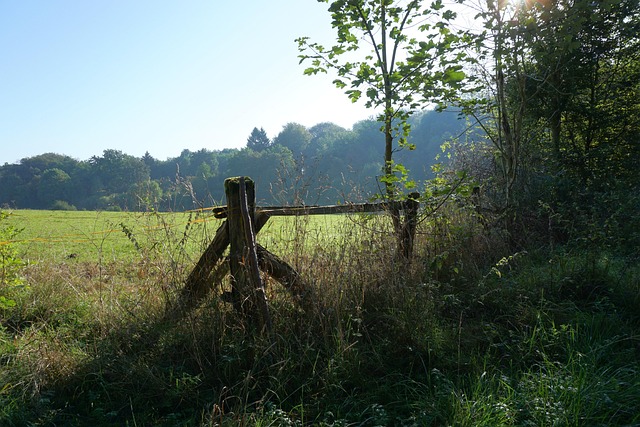In New Bedford, MA, the push for sustainable living extends beyond eco-conscious homes; it’s also transforming outdoor spaces. This shift is evident in the growing popularity of eco-friendly fencing materials, offering both aesthetic appeal and significant environmental benefits. From recycled plastic to organic wood alternatives, these innovative options provide durable, low-maintenance solutions for landscaping while minimizing the ecological footprint. This article explores these sustainable choices, their advantages, and practical guides for implementation in New Bedford.
- Eco-Friendly Fencing Options in New Bedford
- Benefits of Sustainable Fencing Materials
- Natural Barriers for Effective Landscaping
- Reducing Environmental Impact with Eco-Fencing
- Longevity and Low Maintenance Features
- Local Availability and Installation Tips
Eco-Friendly Fencing Options in New Bedford
New Bedford, MA, residents now have a growing array of eco-friendly fencing options to choose from, aligning with the city’s commitment to sustainability. Traditional materials like wood and metal are being replaced by innovative alternatives that not only enhance outdoor spaces but also contribute to environmental preservation.
Among these options, bamboo, recycled plastic, and composite materials stand out. Bamboo fences offer both aesthetic appeal and remarkable strength, while also being a rapidly renewable resource. Recycled plastic fencing is durable, low-maintenance, and significantly reduces the environmental impact compared to traditional vinyl or wooden options. Composite materials, made from a mix of wood fibers and plastic, provide a versatile option that mimics the look of traditional fencing without the associated environmental drawbacks.
Benefits of Sustainable Fencing Materials
Sustainable fencing materials offer numerous environmental and functional advantages for New Bedford residents looking to enhance their outdoor spaces. Firstly, these eco-friendly options reduce the carbon footprint associated with traditional fencing production methods. Many conventional fence materials are derived from non-renewable resources like wood or metal, which contribute to deforestation and greenhouse gas emissions during manufacturing. In contrast, sustainable materials such as recycled plastic, bamboo, or plant-based composites are more environmentally benign, as they utilize readily available resources and can be easily recycled at the end of their lifespan.
Moreover, sustainable fencing can provide long-lasting durability and low maintenance, making it a practical choice for homeowners. Materials like bamboo fences, known for their strength and flexibility, can withstand harsh weather conditions without rotting or warping, reducing the need for frequent replacements. Additionally, these materials often come with built-in resistance to pests and UV damage, ensuring they retain their aesthetic appeal over time. This longevity translates into cost savings for homeowners in New Bedford, as they can avoid the recurring expenses associated with replacing traditional fences more frequently.
Natural Barriers for Effective Landscaping
In the pursuit of sustainable landscaping, natural barriers offer an eco-friendly solution for fencing in New Bedford, MA. These organic alternatives provide both aesthetic appeal and functional benefits, enhancing the overall ecological balance of a property. Materials like bamboo, wood from sustainably managed forests, and even recycled plastic offer durable and visually pleasing options that can effectively delineate spaces without compromising environmental integrity.
Compared to traditional fences made from non-biodegradable materials, natural barriers have several advantages. They contribute to better water drainage and soil health by allowing for root penetration. Moreover, they provide habitat and food sources for local wildlife, fostering biodiversity. In New Bedford’s urban landscape, these eco-friendly fencing materials can help mitigate the heat island effect, promote air purification, and create a more harmonious relationship between human habitats and the natural world.
Reducing Environmental Impact with Eco-Fencing
In an era where environmental conservation is paramount, eco-friendly fencing materials offer a sustainable solution for New Bedford residents and businesses looking to enhance their outdoor spaces. Traditional fencing often involves harmful manufacturing processes and contributes to land and water pollution. However, eco-fencing alternatives are changing the game by minimizing these negative impacts.
These innovative materials utilize natural resources, such as bamboo, recycled plastic, or organic composites, reducing the carbon footprint associated with conventional fencing. By choosing eco-friendly options, New Bedford communities can contribute to preserving local ecosystems and promoting a greener environment. Furthermore, many of these products are designed to be durable and low-maintenance, ensuring long-lasting beauty without compromising ecological well-being.
Longevity and Low Maintenance Features
Eco-friendly fencing materials offer not just an aesthetic appeal but also remarkable longevity and low maintenance features. These modern alternatives to traditional fences are designed to withstand harsh weather conditions, including heavy rain, strong winds, and extreme temperatures, ensuring they remain sturdy and structurally sound for years. With minimal upkeep required, homeowners in New Bedford, MA, can enjoy the benefits of a beautiful, durable fence without spending countless hours on maintenance.
Whether it’s made from recycled plastic, wood composite, or organic fibers, these materials are built to resist rot, pests, and decay, eliminating the need for frequent painting, staining, or replacement. This low-maintenance nature not only saves time and money but also contributes to a more sustainable environment by reducing waste and minimizing the carbon footprint associated with traditional fencing materials.
Local Availability and Installation Tips
In New Bedford, MA, eco-friendly fencing materials are increasingly accessible, offering both aesthetic appeal and environmental benefits. Local hardware stores and garden centers stock a variety of options, from recycled plastic to natural wood treatments that minimize chemical use. These materials not only contribute to a greener landscape but also often come with extended warranties due to their durability and low-maintenance nature.
When installing eco-friendly fencing, consider local climate conditions and soil types for optimal performance. Proper preparation of the fence line ensures a solid foundation. Regular cleaning and maintenance, such as applying natural preservatives or oil, can extend the life of your fence while keeping it looking vibrant. Local professionals specializing in sustainable landscapes can provide valuable insights tailored to New Bedford’s specific needs.
